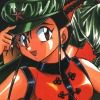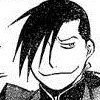| View previous topic :: View next topic |
| Author |
Message |
|
|
doc-watson42
Encyclopedia Editor
 Joined: 10 Feb 2003
Joined: 10 Feb 2003
Posts: 1708
|
 Posted: Mon Jun 10, 2013 6:12 am Posted: Mon Jun 10, 2013 6:12 am
|
 |
|
A small mistake:
| Jason Thompson wrote: | | The draws muscle and impact reminds me of Masahiko Nakahira. |
I think you mean:
| Quote: | | The drawings of muscle and impacts reminds me of Masahiko Nakahira. |
|
| Back to top |
|
|
|
|
gatotsu911
Joined: 18 Jul 2006
Posts: 457
Location: US of East Coast
|
 Posted: Thu Jun 13, 2013 3:16 am Posted: Thu Jun 13, 2013 3:16 am
|
 |
|
|
Back in middle/high school when I was devouring new volumes of Fullmetal Alchemist every few months as they came out, the fact that half of the character and location names would be completely re-Romanized practically every other volume drove me absolutely insane. Now I know who to blame for this, Jason!! (Just kidding. We're cool.)
I kind of lapsed out of the manga at a certain point though, and didn't pick it up again until after high school, at which point I found it difficult to get through because the tone was too shonen-y for my tastes. Some of the surprisingly dark subject matter touched upon by the plot - military dictatorship, ethnic cleansing, amoral scientific experimentation - felt like it was at odds with the Shonen Jump-y tone of the actual writing. Turns out, it wasn't just my fault; the second half of the series really does turn from a character-driven adventure story with detailed social/political subtext into a far more standard good-versus-evil shonen action series, and the entire last third of the manga basically devolves into one long DBZ power-level fight. All of this is why my favorite form of Fullmetal Alchemist will probably always be the first anime series (which I didn't see in its entirety until I'd already read half of the manga), despite its numerous plotting and production flaws as a result of being developed on the lam based on an unfinished manga. It took the tone and themes that were most unique and engrossing about the early parts of the manga, and stuck with them for the entirety of the story, right down to its far more sobering conclusion (in contrast to the manga's fairy-tale ending). I have a whole thesis about how Ed actually has to grow up in the anime, whereas the manga never truly forces him to re-examine his naive worldview (instead reality just neatly conforms itself to his outlook), but that's an argument for another time.
|
| Back to top |
|
|
|
Agent355
 Joined: 12 Dec 2008
Joined: 12 Dec 2008
Posts: 5113
Location: Crackberry in hand, thumbs at the ready...
|
 Posted: Thu Jun 13, 2013 1:25 pm Posted: Thu Jun 13, 2013 1:25 pm
|
 |
|
|
Actually, Ed's development is a great topic of discussion, gatotsu911. FMA1 was the first anime I *really* got into as an adult, and it has a special place in my heart. I like Brotherhood as well, especially the characters in Brotherhood that couldn't be included in FMA1, but there are aspects of FMA1 I like better-the origin of the homunculi, the alternate world aspect, Ed's growth (he's has a completely different outlook on life in Shamballa than he does in episode 1). Of course, Brotherhood gives us Olivier Armstrong, the Xingese characters, Xerxes, Al's growth, and a happy ending. It's safe to say I love both series and Arakawa in general. I'm looking forward to Silver Spoon this summer.
I see Arakawa's development of a Western world with "magic" based on old Western pseudo science and mythology/spirituality (y'all noticed the strangely accurate Kabbalah tree on The Gate's doors, right?) as analogous to Avatar: The Last Airbender's Konietzko and DiMartino's development of an Eastern world with "magic" based on Eastern pseudo scientific principles and spirituality. Both series deal with war, genocide, parental abandonment/death, and child abuse, romance, major character growth, politics, strong female characters and tight action scenes. I know some people might be offended that I dare *mention* an American cartoon in the same paragraph as a shonen anime, but I feel the similarities between the shows are worth pointing out and that the comparison is a complement to both shows.
|
| Back to top |
|
|
|
|
gatotsu911
Joined: 18 Jul 2006
Posts: 457
Location: US of East Coast
|
 Posted: Thu Jun 13, 2013 3:57 pm Posted: Thu Jun 13, 2013 3:57 pm
|
 |
|
|
Well does Avatar have anybody's brains getting blown up I THINK NOT
But yeah, Ed (never mind the other characters) undergoes a lot more actual growth in the anime than in the manga, and it's much more realistically handled - gradual change, the scope of which you're liable to not even realize until you look at the results, as opposed to the manga's tidy epiphanies after which a character changes his or her ways forever (again, standard shonen writing, but out of place in a story that deals with the mature topics that FMA does). For this and a number of other reasons, I think the anime is a lot more mature than the manga, which ends up being reticent to follow the harsh truths suggested by some of its subject matter through to their logical conclusion. (Example: in the real world, genocide and ethnic hatred are not caused by shadowy organizations of of inhuman devils trying to destroy the world or a bunch of nasty old men who just hate everybody, they're caused by people like you and me, who have that capacity for violence, hatred and fear of "others" within them. But that's not a very comforting moral for a boys' manga, so Arakawa cops out and goes for an escapist fantasy with black-and-white morality instead. Meanwhile, the anime is appropriately dark and ambiguous in its handling of such subject matter.)
|
| Back to top |
|
|
|
Agent355
 Joined: 12 Dec 2008
Joined: 12 Dec 2008
Posts: 5113
Location: Crackberry in hand, thumbs at the ready...
|
 Posted: Thu Jun 13, 2013 4:20 pm Posted: Thu Jun 13, 2013 4:20 pm
|
 |
|
I expected a mature response from people who realize that just because American cartoons can't revel in the same amount of gore and violence as their Japanese counterparts, they can still explore the same themes. Well, I didn't really *expect* that, since people always bring up gore and violence to prove anime's superiority, just kinda hoped. 
Also, I specifically asked gatostu911 to expound upon the theme of the differences in Ed's growth between FMA1 and Brotherhood, since I sense that there is a difference, I just can't put my finger on the specifics, and gatotsu911 claimed to have done that. Maybe we can discuss the topic at hand instead of making this another "anime is better than cartoons because violence & nudity" thread.
|
| Back to top |
|
|
|
|
gatotsu911
Joined: 18 Jul 2006
Posts: 457
Location: US of East Coast
|
 Posted: Thu Jun 13, 2013 4:52 pm Posted: Thu Jun 13, 2013 4:52 pm
|
 |
|
|
I'm really not sure what more I could have done there to indicate that my exploding brains comment was not intended as a serious statement.
Although if that's the direction you want to go, I do think it's regrettable that cartoons aimed at children in the United States are so rigidly restricted in the content they can include, even when their subject matter practically necessitates the inclusion of stronger violence or existential threat than your standard "TV-Y7" rating can cover in order to work effectively - meaning that most children's shows trying to take themselves at all seriously are forced to contend with network content standards via awkward write-arounds and compromised plots. That is, in fact, one thing anime does do better than Western cartoons - just because a show is aimed at young audiences doesn't mean it's arbitrarily restricted in its inclusion of violence or mature subject matter if they're thematically appropriate. If a show deals with serious subject matter like war, crime and politics, I think it's far more responsible to show kids some semblance of the actual consequences of violence than to clean it up for the network censors' imagined notions of what children can handle. Then again, maybe the problem is that the perceived American market for animation is either for young children (10 and under), or for adults, in which case it has to be a comedy, because adults (or mass audiences, anyway) apparently can't take serious storytelling in animation seriously. There is no middle ground, no animated shows aimed at the "young adult" demographic to which most shonen and shojo anime is geared, and so anything that really ought to be geared towards such a demographic is instead shoehorned into that "10 and under" market coveted by the likes of Cartoon Network and Nickelodeon. The closest they get to something that doesn't feel compromised for younger audiences, content-wise, are the increasingly rare instances of shonen anime that air on those channels, sometimes with only light-to-moderate censorship.
Anyway, like I said, getting into the specifics of how Fullmetal Alchemist handles character development would take a long time, because it's a long and complex series, so for the time being I'm happy to just describe its effects without going in-depth to identify the cause.
|
| Back to top |
|
|
|
sainta
 Joined: 21 Feb 2011
Joined: 21 Feb 2011
Posts: 989
|
 Posted: Fri Jun 14, 2013 11:07 am Posted: Fri Jun 14, 2013 11:07 am
|
 |
|
|
Maybe I can make a short version
In the anime Edward learns that he is no miserable after all since his journey apparently helped to balance the Equivalent Exchange at the last moment. He has no alchemy.
In the manga Edward realizes he used to rely too much in the alchemy and used it to be stronger. He gives up alchemy after understanding that a going through a different route would not change the destiny point (the roof scene basically sums up this).
What I find different in both characterization is how Edward is related with other characters. In Mizushima's version he ended as a distant person (tv series) while the manga version found strength in trusting others. The way he treats Mustang in both versions could show the difference.
|
| Back to top |
|
|
|
amarielah
 Joined: 11 Apr 2009
Joined: 11 Apr 2009
Posts: 178
|
 Posted: Sat Jun 15, 2013 5:27 pm Posted: Sat Jun 15, 2013 5:27 pm
|
 |
|
|
I think a more general way of summing up their differences are:
03!Ed learns that he can't be selfish in his goals, because he is not separate from the world around him. By that same token, he's more distant from others because he tended to cause more harm than good when he involved himself with other people's business in the past. 03!Ed ultimately clings to the idea of Equivalent Exchange as a way of rejecting what he sees as his father's cynicism.
Manga!Ed learns to overcome his cynicism because his strength lies in his connections to other people, and that alchemy is not the be-all and end-all of life. He doesn't need to rationalize his belief in Equivalent Exchange because it's patently true.
|
| Back to top |
|
|
|
|
